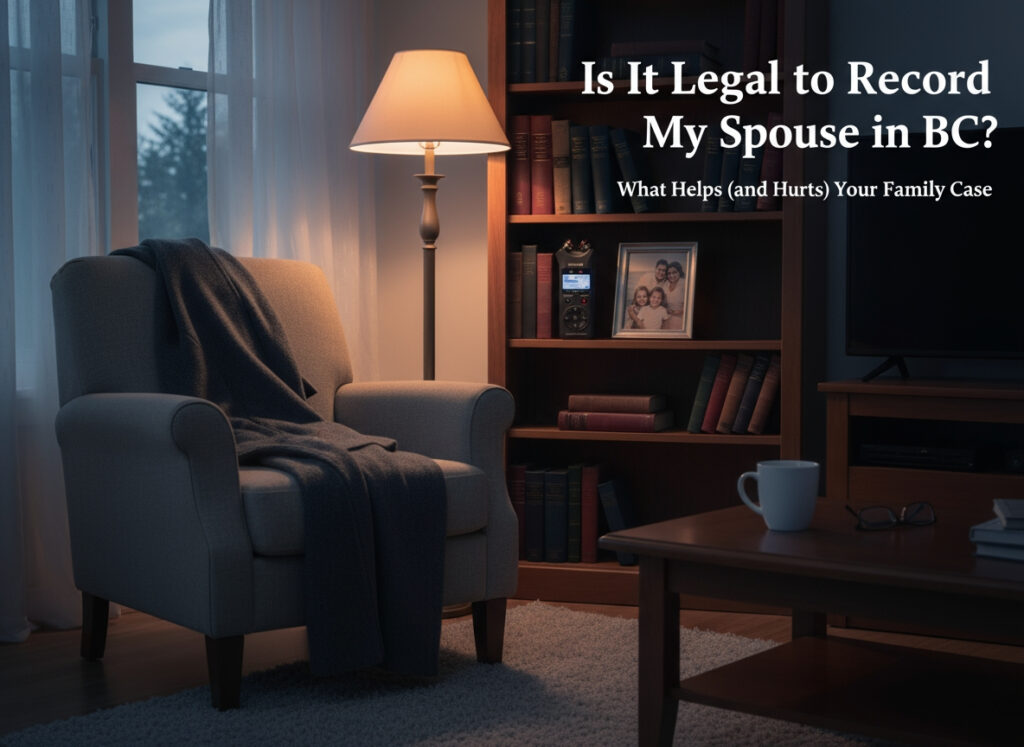
Is It Legal to Record My Spouse in BC? What Helps (and Hurts) Your Family Law Case
In most cases, it is legal to record your spouse in BC if you are part of the conversation. Canada follows a “one-party consent” rule, meaning you can lawfully record discussions you participate in without informing the other person.
However, covert recordings can come with risks in family law matters—potentially damaging your credibility, harming co-parenting relationships, and sometimes being inadmissible in court [Shulman Law Firm].
If safety issues or court orders are involved in your case, it’s critical to seek legal advice tailored to your unique situation before hitting “record.” This article provides a general overview, but shouldn’t be a substitution for discussing your circumstances with a qualified BC family lawyer.
The Law in Canada and BC: Audio vs. Video, Consent, and Privacy
Under Canada’s Criminal Code s.184, recording a “private communication” is legal as long as at least one party consents. That means you can record your own conversations (in-person, phone, virtual) with your spouse. However, it is a crime to plant a device to intercept discussions between others when you’re not present.
Audio vs. Video: Audio-only recordings are governed by the one-party consent rule. Video without audio isn’t criminalized by s.184, but can still violate privacy laws, especially when there’s an expectation of privacy (e.g. bedrooms, bathrooms). Special Criminal Code provisions on voyeurism (s.162) apply if nude or intimate videos are captured without consent.
BC Privacy Act: BC’s Privacy Act allows lawsuits for willful privacy invasion without lawful justification—a real risk for covert video in family homes, even if no criminal charges are laid.
Other Prohibited Contexts: Recording is generally forbidden in BC courtrooms, mediation sessions, many settlement meetings, and may violate protection orders.
How BC Family Courts View Secret Recordings
BC judges often criticize secret recordings in family cases, viewing them as corrosive to co-parenting trust, potentially manipulative (especially if children are involved), and likely to damage the recording parent’s credibility [Shulman Law Firm].
When might audio recordings help your case? If they clearly document threats, harassment, or court order breaches that can’t otherwise be proven, especially if immediate safety is at risk.
When might audio recordings backfire on your case?
- Selective, edited, or out-of-context clips
- Recordings that seem to bait conflict or involve kids
- When privacy, orders, or agreements are violated
- When shared online or outside court
Admissibility of Recordings in BC Courts
Key factors [Vilkhov Law]:
- Relevance: Does it directly relate to the disputed issues in the case?
- Legality: Participant recordings (legal) or illegal interception (excluded)?
- Privacy breach: Even legal recordings can be challenged if privacy is violated.
- Authenticity: Original, unaltered files and accurate transcripts are vital.
- Exclusions: Settlement/mediation discussions are usually privileged.
For a deeper exploration into what makes evidence—from digital recordings to surveillance—admissible in BC family courts, see our guide: Are Private Investigator Reports Admissible in BC Courts?
Practical Decision Framework: Should You Record?
- Are you a participant? If not, don’t record.
- Is it a private space? Home video/audio is high-risk under BC’s Privacy Act.
- Clear, non-manipulative purpose? Only record if truly needed for evidence and no less invasive option exists.
- Safety-first: For immediate risk, get police help and consider a protection order vs DIY recording.
Best Practices for Parenting Exchange Recordings
- Use public locations, co-parenting apps, or supervised exchanges to reduce recording “need.”
- If you must record: Be open, avoid kids’ faces, capture full context minus commentary.
- Selective or hostile recording can escalate conflict and may hurt your case.
If you’re considering professional support for child-related cases, learn how a private investigator can help in our article: Child Custody Cases — Protecting What Matters Most
Alternatives That Often Work Better
- Texts, emails, and co-parenting app logs
- Detailed notes or journals
- Police reports, medical records, and workplace incidents
- Witness statements and third-party accounts
How to Prepare and Share Recordings with Your Lawyer
- Preserve originals; provide clean copies
- Log date, time, people, place, and key points chronologically
- Prepare short, relevant clips with full backup and good transcripts
- Never post recordings online—disclose only via your lawyer
FAQs
Q: Can I record my spouse at home in BC? A: Often yes if you’re a participant, but privacy claims may arise. Get legal advice.
Q: Can I record calls with my spouse?
A: Yes, if you’re on the call (one-party consent).
Q: Can I record my spouse when I’m not there? A: No, that’s illegal interception under Criminal Code s.184.
Q: Is video-only safer than audio?
A: Not necessarily. Private video may still breach BC’s Privacy Act.
Q: Can I use recordings of our kids? A: Courts often disapprove unless truly needed for safety and done properly.
Q: What if my spouse recorded me illegally?
A: Consult your lawyer. Illegal or privacy-breaching evidence may be excluded.
Q: Can I record mediation or court? A: No. Both are prohibited by law or policy in BC.
The Bottom Line
While recording your spouse is often legal in BC if you’re a participant, it can still carry risks in family law—even if charges are never laid. Weigh necessity and admissibility carefully, and always prioritize lawful solutions that preserve safety, privacy, and co-parenting.
For your unique situation, get tailored guidance from an experienced family lawyer in BC. One-size-fits-all advice is no substitute for professional counsel based on your specific circumstances and goals.
For a complimentary, obligation-free consultation, please get in touch with us at 604-657-4499, info@shadowinvestigationsltd.ca, or fill out our contact form below with your preferred contact method and a brief overview of what you would like assistance with. We keep all information confidential and only use contact information to respond to inquiries.
"*" indicates required fields
About the Author

